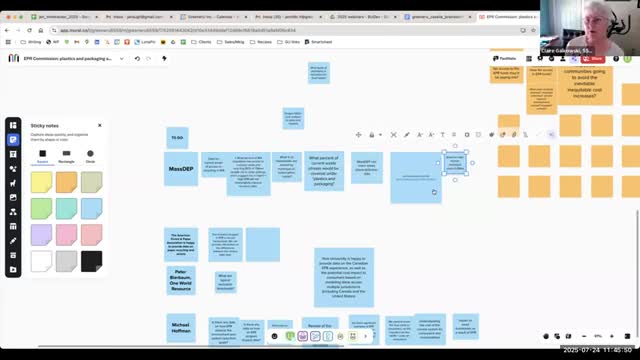Massachusetts Officials Assess Recycling Costs and EPR Packaging Legislation Impact
July 26, 2025 | Massachusetts Department of Environmental Protection, Executive , Massachusetts
This article was created by AI summarizing key points discussed. AI makes mistakes, so for full details and context, please refer to the video of the full meeting. Please report any errors so we can fix them. Report an error »

In a recent meeting held by the Massachusetts Department of Environmental Protection (MassDEP), local officials and stakeholders gathered to discuss the pressing issue of Extended Producer Responsibility (EPR) for packaging and plastics. The atmosphere was charged with urgency as participants shared their experiences and concerns regarding the rising costs of recycling, which have reportedly doubled or tripled over the past decade for many towns on the South Shore. These escalating expenses are being passed on to residents, prompting a call for a more equitable approach to managing waste and recycling.
One key discussion point centered on the need for a comprehensive understanding of the state's recycling infrastructure. Participants emphasized the importance of knowing how many residents have access to curbside recycling and what materials are actually being processed. A representative highlighted the significant amount of recyclable material that ends up in trash bins, particularly in public spaces like gas stations, where much of the waste could be diverted from landfills if proper systems were in place.
The conversation also touched on the lack of specific data regarding material recovery rates in Massachusetts. Currently, the state does not calculate an overall recycling rate, which complicates efforts to establish fair fees for producers based on the materials they generate. This gap in data collection means that substantial amounts of recyclable materials, such as cardboard collected by retailers, go untracked, leaving a blind spot in the state's recycling efforts.
In response to these challenges, a proposed bill in the environmental committee aims to expand EPR to include small businesses and other facilities that generate significant amounts of waste. This legislation seeks to reimburse private haulers for collecting materials from these entities, recognizing that much of this waste is mixed together at processing facilities, complicating recycling efforts.
As the meeting concluded, participants were left with a sense of urgency to clarify the complexities of EPR for packaging and plastics in Massachusetts. The discussions underscored the need for better data, broader inclusion of waste-generating entities, and a more transparent approach to managing the costs associated with recycling. With the stakes high for both the environment and local budgets, the path forward remains critical for the future of waste management in the state.
One key discussion point centered on the need for a comprehensive understanding of the state's recycling infrastructure. Participants emphasized the importance of knowing how many residents have access to curbside recycling and what materials are actually being processed. A representative highlighted the significant amount of recyclable material that ends up in trash bins, particularly in public spaces like gas stations, where much of the waste could be diverted from landfills if proper systems were in place.
The conversation also touched on the lack of specific data regarding material recovery rates in Massachusetts. Currently, the state does not calculate an overall recycling rate, which complicates efforts to establish fair fees for producers based on the materials they generate. This gap in data collection means that substantial amounts of recyclable materials, such as cardboard collected by retailers, go untracked, leaving a blind spot in the state's recycling efforts.
In response to these challenges, a proposed bill in the environmental committee aims to expand EPR to include small businesses and other facilities that generate significant amounts of waste. This legislation seeks to reimburse private haulers for collecting materials from these entities, recognizing that much of this waste is mixed together at processing facilities, complicating recycling efforts.
As the meeting concluded, participants were left with a sense of urgency to clarify the complexities of EPR for packaging and plastics in Massachusetts. The discussions underscored the need for better data, broader inclusion of waste-generating entities, and a more transparent approach to managing the costs associated with recycling. With the stakes high for both the environment and local budgets, the path forward remains critical for the future of waste management in the state.
View full meeting
This article is based on a recent meeting—watch the full video and explore the complete transcript for deeper insights into the discussion.
View full meeting
